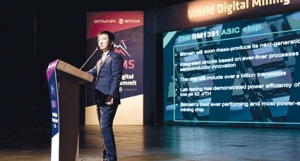New Mining Chip Unveiled In Tbilisi
Chinese Bitcoin mining giants, Bitmain have recently announced the development of a new 7nm mining chip that could change the game for the mining of Bitcoin. This ‘next-generation’ 7nm application-specific integrated circuit (ASIC) chip, known as the BM1391, was launched at the World Digital Mining Summit in Tbilisi, Georgia. Jihan Wu, CEO, Bitmain, confirmed that the BM1391 chip is set for deployment in its next iteration of mining rigs.
The bitcoin mining industry is having an exciting couple of days because the developments at Bitmain come literally hours after competitors; Bitfury also confirmed the launch of a new 14nm mining chip, labeled the Bitfury Clarke. However, the next-generation offering from Bitmain is said to offer improved hashing power and energy efficiency in comparison with older models of ASIC processors. The new 7nm mining chip is built for mining cryptocurrencies using the SHA256 algorithm.
Now if you do not understand any of this don’t worry, here is a quick crash course on bitcoin and the mining of bitcoin. The aim of bitcoin at the end of the day is to provide a way to exchange tokens of value online without having to rely on centralized intermediaries, such as banks. Instead the necessary record-keeping is decentralized into a “blockchain”, an ever-expanding ledger that holds the transaction history of all bitcoins in circulation, and lives on the thousands of machines on the bitcoin network. Where a central authority is absent, mining replaces it.
Every few minutes, mining computers, such as antminers, collect a few pending bitcoin transactions called a block, and turn them into a mathematical puzzle. The first miner to find the solution announces it to the network. The other miners then check whether the sender of the funds is authorized, and whether the solution to the puzzle is correct. If enough of them grant their approval, over 50% of them, the block is cryptographically added to the ledger and the miners move on to the next set of transactions, essentially creating a blockchain.
The miner who found the solution first gets a certain amount of bitcoins as a reward, but only after another 99 blocks has been added to the chain. This is what gives miners an incentive to participate in the system and validate transactions. Mining pools are also formed where miners pool their computing resources in order for the group to solve the puzzle first and the split the reward. Having the miners solve puzzles in order to add to the chain provides protection, because in order to double-spend a bitcoin, you would need to rewrite the blockchain. Keep in mind that bitcoin miners now have a combined number-crunching power of about 13,000 times more than the world’s 500 biggest supercomputers and you’ll need to control more than half of that network’s puzzle-solving capacity. Such an attack would be virtually impossible.
Now that you understand the basics, you can imagine the implication of a new chip on the market such as the BM1391, which incorporates an advanced semiconductor manufacturing technology, known as 7nm FinFET. It features over one billion transistors that are optimized for energy efficiency. At a time when energy consumption is a major talking point in the crypto mining space, Mr. Wu confirmed that the BM1391 chip is capable of achieving a ratio of energy consumption to mining capacity that is as low as 42J/TH. Although more detailed specifications are yet to be unveiled, the chip is already being mas-produced.
Bitmain owns one of the largest automatic mining pools, called AntPool. The brand is the fourth largest Bitcoin mining pool, boasting almost 11% of the network’s total hashrate in recent weeks. In a bid to increase the exposure of Bitcoin mining and to shine a spotlight on its expansion efforts – including a mega crypto mining and data centre in Rockdale, Texas – AntPool has signed with a sponsorship deal of NBA team, Houston Rockets for the 2018/19 NBA season.
As part of the agreement, AntPool will be launching a new exhibition at the Toyota Center, which is the home of the Rockets. The Houston Rockets have a surprisingly large supporter base in China, where Bitmain is headquartered. Haijiao Li, overseas operations manager, AntPool, spoke in glowing terms of the sponsorship deal with the Rockets. Li said that as the cryptocurrency industry around the globe continues to evolve and develop there will be a greater need for brands such as AntPool to drive the conversation and conversion of consumers to educate the benefits of digital assets.
Bitmain has doubled down on cryptocurrencies: in addition to selling kit to mine bitcoin, it holds $886.9m of cryptocurrencies, including bitcoin, bitcoin Cash and ethereum, accounting for 28 per cent of total assets at end-June. These, it said, were accounted for at cost rather than market value. It also accepts digital currency for its kit. Bitmain’s funding round was hounded by issues, including complaints of different prices and inaccurate information. Temasek, Singapore’s investment arm, was forced to put out a statement denying any involvement, or even discussions, with Bitmain. Early backers were told Bitmain hoped to be worth $30bn to $40bn in three years. Unusually, Bitmain has handed the mandate for its IPO to a single bank, China International Capital Corp. Chinese companies usually boast a long line of sponsors and advisers when they list, heavily tilted towards the big global investment banks.
By Shawn Wayne
Image source: bitsonline.com











